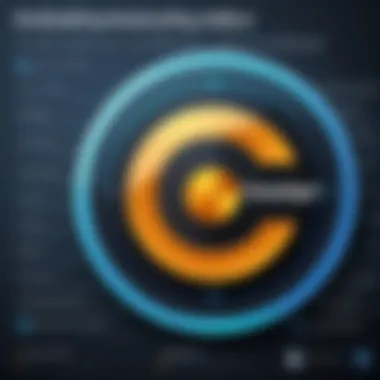A Comprehensive Guide to Downloading Music to Your PC for Free


Intro
In an era dominated by digital music consumption, the need for accessing songs freely while respecting copyright laws becomes vital. This guide offers insight into the various methods available for downloading music to your PC without incurring any costs. Understanding the legal implications and utilizing the right tools can enhance your music collection while keeping you on the right side of the law. Notably, exploring legitimate sources is not only ethical but also enriches your experience as a music listener.
Product Overview
This section discusses the landscape of available platforms and tools for downloading music legally. The focus is on software and websites that cater to free music acquisition.
- Description of the product
When referring to tools for music downloading, many options present themselves. Popular players include Free Music Archive, Jamendo, and SoundCloud. Each platform features a diverse catalog of songs across various genres, often supplied by independent artists seeking exposure. - Key features and specifications
Each service typically includes:
- Extensive music library: A wide range of musical styles and genres.
- User-friendly interface: Easy navigation enhances the experience of finding and downloading music.
- Download options: Separate download links for various file formats like MP3 and WAV.
In-Depth Review
An examination of these platforms' performance and usability is essential for users.
- Performance analysis
The performance of music downloading platforms varies significantly. Notably, platforms like Free Music Archive are known for their lightly moderated spaces and steady upload rates. In contrast, SoundCloud may experience fluctuating speeds due to its high traffic. - Usability evaluation
User experience also differs among platforms. For instance, Jamendo makes the sign-up process straightforward, allowing users to download music seamlessly. Meanwhile, some less-known sites may present navigation challenges, potentially discouraging less tech-savvy individuals.
"While technology has made music more accessible, it is crucial to remember the importance of ethical consumption."
The End
In summary, downloading music to your PC for free can be accomplished responsibly through various ways. The emphasis remains on understanding both the tools at your disposal and the legal connotations involved. By adhering to ethical downloading practices, music enthusiasts can enjoy their favorite tunes while supporting artists in their creative endeavors.
Prelims to Music Downloads
The process of downloading music has undergone significant changes since the inception of digital technology. This transformation not only affects how we consume music but also shapes how we perceive ownership and accessibility. In this article, we will explore various aspects of downloading music to your PC. Our focus will be on understanding the methods available today, the tools that facilitate this process, and the legal and ethical considerations to keep in mind.
In an age where instant access to music is paramount, the desire to download songs has become increasingly common among users. The benefits of having music files readily available on a personal computer are numerous. For one, downloading allows individuals to create personalized playlists that can be accessed offline without the need for an internet connection. This personalized experience enhances the enjoyment of music.
Additionally, downloading music to your PC can often lead to better sound quality compared to streaming services. Many users prefer high-bitrate downloads that offer a richer audio experience. This is particularly true for audiophiles who prioritize sound fidelity.
Moreover, understanding the nuances of downloading ensures that individuals can navigate the minefield of copyright laws. By acquiring music properly, you not only support artists but also protect yourself from potential legal repercussions.
As we proceed into the specific facets of downloading music, it is essential to recognize that being informed and ethical in your methods is vital. Knowing how to legally acquire music, along with the rights and responsibilities that come with downloads, will enable you to enjoy your music collection fully. A deliberate approach to music acquisition opens the door to a wealth of resources, songs, and genres that might otherwise go unnoticed. Ultimately, knowledge empowers the listener.
Legal Considerations in Music Downloads
In the realm of music downloading, understanding the legal landscape is critical for anyone looking to acquire music for free without infringing on copyright laws. This section delves into the fundamental legal principles that govern music downloads. It highlights the risks associated with illegal downloads and the advantages of using legitimate resources. Navigating these considerations not only protects the user but also respects the rights of artists and producers.
Understanding Copyright Laws
Copyright laws exist to protect the intellectual property rights of creators. In essence, these laws give artists and record labels exclusive rights to their music, ensuring they can control its reproduction, distribution, and public performance. Activating these laws is vital when downloading music to a PC.
The United States Copyright Office outlines several key points:
- Originality: For a work to be eligible for copyright, it must be original and fixed in a tangible medium.
- Duration: Copyrights generally last for the life of the creator plus 70 years, after which the work enters the public domain.
- Rights Granted: Copyright holders have the right to reproduce, distribute, and display their works.
Failure to adhere to these laws can result in legal consequences, including fines or lawsuits. Therefore, understanding and respecting copyright not only supports the music industry but also safeguards individual users from potential legal issues.
Legitimate Sources vs. Piracy
When it comes to music downloads, distinguishing between legitimate sources and piracy is crucial. Legitimate sources offer music in a way that respects copyright laws. Examples include platforms like SoundCloud, Bandcamp, and free music libraries like Free Music Archive.


Characteristics of Legitimate Sources:
- Clear Licensing Information: These platforms clearly state how the music can be used, often allowing users to share or download under specific conditions.
- Support for Artists: Using legitimate platforms often means that artists receive compensation for their work.
In contrast, piracy involves downloading music from sites that do not have permission from copyright holders. While it may seem like a cost-saving measure, piracy has significant drawbacks:
- Legal Risks: Engaging in piracy can lead to hefty fines and legal action against individuals.
- Poor Quality: Many pirated tracks suffer in quality and can be riddled with malware.
To summarize, adhering to legal considerations in music downloading nurtures a fair system where artists are compensated for their creativity and efforts. Users benefit from high-quality music while avoiding potential legal dilemmas by using the correct channels.
Identifying Legitimate Music Download Platforms
Identifying legitimate music download platforms is crucial for anyone attempting to navigate the digital music landscape. Unlike informal sources, legitimate platforms offer compliant access to music that respects copyright laws. These platforms help music creators and artists gain rightful compensation for their work. Moreover, utilizing these sources reduces the risk of downloading malware or engaging in illegal activities that can lead to penalties. By prioritizing legitimate platforms, users can enjoy their favorite tunes while supporting the artists behind the music.
Free and Legal Music Websites
Many users seek free music legally, and certain websites cater to this need. These platforms provide extensive catalogs of music that users can download without the fear of infringing copyright laws. Here are some reputable websites to consider:
- Jamendo: Jamendo offers a vast array of independent music. Artists can share their work freely, and users can download songs for personal use.
- Free Music Archive: This curated library provides access to a multitude of songs across different genres. The music is available under various licenses, enabling users to download and use tracks legally.
- SoundCloud: Some artists on SoundCloud allow downloads of their tracks. Look for the download button on eligible posts to grab tracks directly from emerging artists without any charge.
Remember, while searching for music, always verify the licensing on each track. These websites typically indicate whether a song is free to download legally.
Open Source Music Libraries
Open source music libraries are invaluable resources for those looking to download music free of charge while adhering to legal standards. These libraries provide music under licenses that allow users to share, remix, and utilize music freely. Notable examples include:
- Creative Commons: This initiative provides free licenses for creators to share their work. By exploring the Creative Commons section, users can find music that can be downloaded, modified, and shared under specified terms.
- ccMixter: This platform allows users to find remixed music and engage in creative collaborations. Users can download tracks for personal projects, ensuring compliance with the specified licenses.
- Public Domain Audio: This library offers music whose copyright has expired. Users can freely download and use tracks with no restrictions.
When exploring open source music libraries, pay attention to the terms of use. Each library has specific rules defining how the music can be interacted with.
Tools to Download Music to Your PC
In the age of digital media, tools for downloading music to your PC are crucial. They enable users to legally acquire and manage their music collections efficiently. Various methods exist, and knowing the right ones can make a significant difference. It's less about simply obtaining tracks and more about choosing the best tools that respect copyright laws and offer a smooth experience.
Using Browser Extensions
Browser extensions are small add-ons that enhance web browsers’ functionality. They can be particularly useful for downloading music. Extensions like Video DownloadHelper or Easy YouTube Video Downloader allow users to save audio files directly from streaming platforms. This saves time and bypasses complicated download processes.
Users need to ensure their chosen extension is from a reputable source to avoid potential malware. Also, compatibility with the browser version is vital to maintain seamless functionality.
Desktop Applications for Music Downloading
Desktop applications provide more comprehensive features compared to browser extensions. They can support downloads from various sources and often have built-in audio management tools. Examples include JDownloader and 4K YouTube to MP3. These applications can convert files into multiple formats and manage download queues effectively, streamlining the entire process.
Features to Look For
When selecting a desktop application, users should consider several key features:
- Multi-format support: The app should be able to convert downloaded music into different audio formats.
- Batch downloading: This feature lets users download multiple files simultaneously, saving time.
- Speed optimization: Faster download speeds are essential for a better user experience.
A unique aspect of these applications is often the inclusion of a built-in search functionality, which enables users to find and download music without needing to navigate to different sites.
Comparative Pros and Cons
Understanding the pros and cons of browser extensions versus desktop applications can help users make informed decisions:
- Browser Extensions:
Advantages: Simple to use and quick to install, they allow music downloads directly from browsers without additional software.
Disadvantages: Limited in features and can sometimes struggle with sites that have strong anti-download measures. - Desktop Applications:
Advantages: Offer extensive features like file conversions and better management options. Some even allow downloads from a variety of streaming sites.
Disadvantages: Require installation and can take more system resources.
Figuring out which tool to use often comes down to personal preference and specific downloading needs. However, knowing the strengths and weaknesses of each can lead to a more tailored experience.


Step-by-Step Guide to Downloading Music
Downloading music to your PC can seem complicated, but this guide breaks down the process into clear, manageable steps. Understanding how to download music safely and legally is important because it allows you to enjoy your favorite tracks while respecting the rights of artists and content creators. Moreover, mastering the downloading process can significantly enhance your music library without any legal ramifications.
Preparing Your PC for Downloads
Before starting to download music, it is essential to prepare your PC. This preparation involves ensuring your computer is secure and ready for the downloading tasks. Start by updating your operating system and antivirus software. This will help protect your system from potential threats when accessing different websites.
Next, clear any unnecessary files or applications that might slow down your computer. Ensure you have enough storage space for your downloads. Also, create a dedicated folder for your music. Having an organized structure will make it easier to locate your files later. An organized library can improve your overall experience as you expand your music collection.
Downloading from a Website
Once your PC is ready, you can begin downloading music from legitimate websites. Many sites offer free music downloads, but you need to ensure they are legal. Check user reviews and the site's reputation to avoid pitfalls. Websites like Bandcamp, Jamendo, or SoundCloud often provide artists' music for free.
To download a track, first search for the desired song or artist. Click on the download link; usually, it is straightforward. This might involve simply clicking a 'download' button. Note that some websites may require you to create an account before downloading. After the download is complete, verify the file's format. Common formats include MP3, WAV, and FLAC. Make sure you have an appropriate player that supports these formats.
Using Software to Download Music
Another effective method for downloading music involves using specialized software. Various applications are designed for music downloading, providing features that can enhance the process. Look for applications like 4K Video Downloader or Freemake Audio Converter. These tools often provide additional benefits, such as downloading playlists or converting file formats.
When selecting software, consider features like:
- User Interface: Ensure it is easy to navigate.
- File Formats: Check if it supports the formats you need.
- Speed: Fast downloading can save you time.
- Compatibility: Make sure it works with your operating system.
After installing the chosen software, put in the URL of the track or playlist you wish to download. Follow the prompts to complete the process. Each application may have a slightly different procedure, but most are intuitive and user-friendly.
By following these steps, you can effectively download music to your PC. Remember that downloading should always respect copyright laws and the rights of the artists involved.
Managing Your Music Library
Managing your music library properly is vital for enhancing your digital music experience. With countless tracks available for download, the organization of these files can quickly become overwhelming. A well-managed library allows for quick access to your favorite songs and albums, making your listening sessions more enjoyable and less time-consuming. Moreover, it helps to maintain clarity and efficiency in your PC's storage and performance.
Organizing Your Music Files
The first step in managing your music library involves organizing your music files. Start by creating a folder structure that makes sense to you. You could categorize your music by artist, album, or genre.
Here are some key practices to consider while organizing:
- Consistent Naming Conventions: Use a standard naming pattern for your music files. This could include the artist’s name, song title, and album. For example, "Artist - Song Title.mp3." This makes searching for songs easier later on.
- Utilize Metadata: Ensure that the metadata of each music file is complete and correct. This includes artist name, album, genre, and track number. Tools like MusicBrainz Picard help to edit and organize your music metadata efficiently.
- Folder Subcategories: Within artist folders, create subfolders for albums or singles. This can help you minimize clutter and find music quickly.
- Regular Maintenance: Periodically review your music library for duplicates or low-quality files. Remove anything that you no longer want. This can save space and improve the overall performance of your PC.
By following these practices, you will keep your music files accessible and organized.
Using Music Players on Your PC
After gathering and organizing your music collection, the next component of managing your music library lies in utilizing effective music players on your PC.
Music players allow you to play your organized collection, create playlists, and manage playback options. Here are some popular options you might consider:
- VLC Media Player: This is an open-source media player and can handle multiple audio formats. It provides features for both simple playback and more advanced options, such as customizing equalizers.
- iTunes: Although primarily known for its iOS integration, iTunes is still a powerful music player and library manager. It offers various features such as creating playlists, syncing to devices, and downloading from Apple Music.
- Foobar2000: This lightweight player is great for advanced users as it provides extensive customization. It supports multiple file types and has a user-friendly interface.
Using these music players, you can enjoy various functionalities such as:
- Creating Playlists: Group your music based on themes, moods, or events.
- Equalizer Settings: Adjust audio settings to fit your personal preference.
- Import and Export Options: Easily add new music files or share playlists with friends.
By integrating organized files with a suitable music player, you can maximize your overall music listening experience. Keeping your library tidy and utilizing dedicated software helps streamline access and enjoyment.


Troubleshooting Common Issues
In any process involving technology, encountering obstacles is likely. This section addresses the common issues faced during music downloads to a PC. Understanding these problems and their solutions will enhance your experience. It minimizes frustration and helps you maintain an efficient workflow. Troubleshooting is essential for optimizing the downloading process.
Dealing with Slow Download Speeds
Slow download speeds can be especially frustrating. Various factors contribute to this issue, such as your internet connection, the website hosting the music, or even your computer’s performance. Here are some steps to help overcome slow download speeds:
- Check your internet connection: Ensure that your internet is stable. You may want to reset your router or modem if problems persist.
- Use a wired connection: If you are on Wi-Fi, switching to a wired connection may improve speeds.
- Close unnecessary applications: Other applications running on your computer may use bandwidth. Closing them can free up resources for your download.
- Try different platforms: Some websites or services may have better speeds than others. It can be worth experimenting with different sources.
It is critical to recognize that sometimes, the problem lies with the server from which you are downloading. In such cases, patience may be required. If an issue persists, consider reaching out to the support team of the service you are using.
Resolving File Format Compatibility Problems
Downloading music often leads to situations where file formats are incompatible with your media player. Addressing these format issues ensures that you can listen to your tracks without hurdles. Here are points to consider:
- Know your player’s supported formats: Most media players support common formats like MP3, WAV, and AAC. Understanding these will aid in making informed downloads.
- Convert files if necessary: If a downloaded file is in an unsupported format, use a file converter tool. Aim for one that supports various formats to increase compatibility. Popular options include formats such as FLAC and OGG.
- Check settings in your player: Occasionally, the media player itself may require certain configurations. Ensure it is set correctly to handle various formats.
- Seek tools for troubleshooting: Some tools can aid in detecting and fixing compatibility issues automatically. You may want to explore these options to simplify the process.
"Sometimes a simple conversion can open a world of audio possibilities."
Understanding these common issues will empower you to resolve problems effectively. This ensures a smoother experience when downloading music on your PC.
Future Trends in Music Downloads
Understanding the current trends in music downloads is vital for anyone wanting to stay relevant in the ever-evolving music industry. As technology advances, the ways we acquire and listen to music change. This section will explore two key future trends: the rise of streaming services and the impacts of blockchain technology. Both have profound implications on how we access music and the ethical considerations surrounding music downloading.
The Rise of Streaming Services
Streaming services like Spotify, Apple Music, and Tidal have fundamentally reshaped the landscape of music consumption. Unlike traditional downloading, streaming allows users to access vast libraries of songs without needing to own files. The convenience of streaming is a huge attraction. It offers instant access to music without the commitment of a purchase.
- Subscription models provide unlimited access. This can be cost-effective for avid music listeners.
- Curated playlists and personalized recommendations enhance user experience. Algorithms analyze listening habits to provide tailored suggestions.
- Streaming services often collaborate with artists for exclusive releases, changing how artists distribute their work.
While streaming offers many benefits, it does complicate the notion of ownership. Users do not own the music but pay for access. This leads to debates about artist compensation, as most streaming platforms pay artists a fraction of a cent per stream. This can create challenges for independent musicians who rely on downloads for income.
Impacts of Blockchain Technology
Blockchain technology is weaving its way into the music industry, presenting new opportunities for both artists and listeners. This decentralized ledger has the potential to revolutionize how music rights are managed and how artists are compensated.
- Blockchain can create direct pathways for artists to distribute their music. This cuts out intermediaries and allows for fairer payments. Artists can receive payments directly from listeners.
- Smart contracts could be used to automatically distribute royalties whenever a track is played. This ensures that artists are paid fairly and transparently.
"Blockchain reshapes the music industry landscape, returning power to the artists."
However, the adoption of blockchain is not without challenges. Complexity of technology can deter users. Moreover, the long-standing establishment of traditional music distribution channels may resist change. Yet, as tech-savvy consumers seek better ways to support their favorite artists, blockchain may find a foothold in music downloads and streaming.
The End
In the exploration of downloading music for free to your PC, we have navigated the complexities of legal and ethical considerations, the evolution of music acquisition, and the technological tools available. Understanding these facets is crucial as it provides a roadmap for safe and responsible music downloading. The implications of copyright laws cannot be overstated; ignorance of these rules can lead to costly penalties for individuals and creators alike.
Summarizing Key Points
To recap, here are the key points discussed in the article:
- Legal Landscape: Familiarizing oneself with copyright laws and distinguishing between legitimate and pirated sources is paramount.
- Platforms and Tools: Various platforms, such as Bandcamp and SoundCloud, offer safe avenues for downloading music legally. Browser extensions and desktop applications also enhance the downloading experience.
- Management Strategies: Organizing your music library efficiently can help in maintaining order and enjoying your collection.
- Troubleshooting: Recognizing and solving common issues can significantly enhance the downloading process.
- Looking Forward: The future of music downloads is undoubtedly influenced by trends like streaming services and advancements in technologies such as blockchain.
Encouraging Ethical Downloading Practices
It is indispensable for consumers and music enthusiasts to engage in ethical downloading practices. Such behaviors not only support the artists but also contribute to a sustainable music ecosystem. Some practices to consider include:
- Choose Reputable Sources: Always download music from reliable platforms that compensate artists fairly, like iTunes or Amazon Music.
- Consider Creative Commons: Explore music made available under Creative Commons licenses. These tracks often allow for personal use without infringing copyright laws.
- Support Independent Artists: Purchasing music directly from an artist's website can ensure a larger portion of the proceeds goes to the creator.
- Stay Informed: Keep abreast of current laws and guidelines related to music downloads. Understanding updates can protect you from potential legal issues.
By adopting these ethical practices, you not only respect the work of musicians but also enhance your own experience as a listener. With this guide, you are now equipped to navigate the world of free music downloads with knowledge and confidence.



